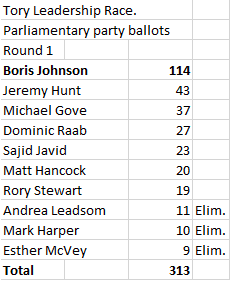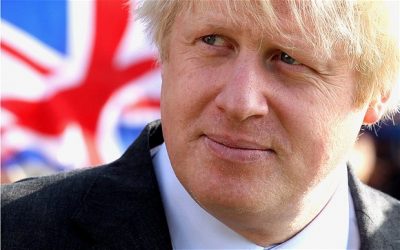Although Boris Johnson is some way short of a majority of the parliamentary party votes, it is very hard to see anyone else overtaking him, and he only needs 105 votes to make it into the top two and go forward to the vote of all party members in any case. He also leads all opinion polling of conservative party members and so we can more or less take his election for granted at this stage, barring some spectacular snafu, which, given this is Boris, cannot be entirely discounted. To avert this possibility, his handlers have been keeping him on a tight rein, limiting his public appearances, and even giving him a slightly tidier haircut…
It is difficult to imagine a leader less likely to extract concessions from the EU than Boris Johnson who has built his career on writing falsehoods about the EU as Brussels correspondent for the Telegraph and in some ways set the entire Brexit bandwagon rolling. Jeremy Hunt comes a close second for comparing the EU to the Soviet Union to the chagrin of all the eastern European states which had actually had to live under Soviet Union hegemony.

Economic realists assume the EU will eventually come to a deal with him because it is in everyone’s economic interests to do so, but that is to ignore the fact that the EU is primarily a political construct to maintain peace on the continent and some economic price is worth paying if it maintains that political solidarity and social cohesion.
With the European Commission Brexit negotiating team having been disbanded, with the Commission itself going on holidays for the summer, and with a new Commission and other key EU roles due to be appointed in the next few weeks/months and not taking office until November, it is hard to see how any substantive negotiations can take place before the UK is due to leave next November.
Boris will probably prefer talking face to face with Prime Ministers in any case, but, again, it is difficult to see the European Council unanimously agreeing a further A.50 extension barring a “democratic event” such as a General Election which might produce a new and different government before then.
It now becomes a question of whether Angela Merkel and other key leaders are prepared to throw Ireland under a bus and agree to drop the “Irish Backstop” from the Withdrawal agreement in order to facilitate “an orderly Brexit”, or will they maintain solidarity with the member state most effected by Brexit?
I humbly suggest the EU might as well fold up its tent and go into oblivion if it is prepared to do so. Not because Ireland is all that important, but because political solidarity and social cohesion is what the EU is, and should be all about. It is the Brexiteers’ wet dream to hasten the break-up of the EU, so why should the EU facilitate them?
Of course some fudge is always possible. Brexiteers like to point out that a hard “no deal” Brexit will force the creation of a hard customs border in Ireland in any case, but for how long could the UK maintain a no deal stance? Strictly speaking, if there is no deal, UK airline will lose landing rights in EU airports and customs controls would severely impact EU/UK trade.
Perhaps that is precisely what is required to inject some reality into UK political discourse… Brexiteers like to extol the virtues of trade under WTO rules, but WTO rules don’t cover services – 70% of the UK economy – and there is far more to EU/UK integration and cooperation than is ever covered under WTO or Free trade Agreements.
None of these issues are likely to be resolved, one way or the other, by November, so absent a general election, a hard, no deal, Brexit seems the most likely scenario. Dominic Raab has even suggested proroguing parliament to push through a no deal Brexit over the heads of parliamentary objections, but could the UK constitution, unwritten as it is, survive such a flagrant attack on democracy?
The Telegraph (which pays dearly for Johnson’s weekly column) is running with a poll which suggests Johnson could win a 140 seat majority in Parliament if he called a general election as PM, so that could well be the strategy. That didn’t work out so well for Theresa May though, who had even larger projected majorities when she called the June 2017 election.
Corbyn would probably run on the basis of a Labour renegotiated Brexit deal subject to a second referendum which could unite soft Brexiteers and Remainers against a hard, no deal, Tory stance. However even if Johnson won an overall majority (which I consider unlikely), he would no longer be tied to the DUP, and he conspicuously refused to reassure them that he wouldn’t go with a N. Ireland only backstop which would overcome Brexiteer objections to GB being “trapped” in the Customs Union and Single Market and be in line with the EU and Irish negotiating position all along.
Either way, a general election would probably be the only way to overcome the current paralysis in UK politics and lead to a more consensual way forward.
*
Note to readers: please click the share buttons above or below. Forward this article to your email lists. Crosspost on your blog site, internet forums. etc.
This article was originally published on European Tribune.
Frank Schnittger is editor of the European Tribune [Eurotrib.com] and have authored and published over 500 front page articles on the site mostly on European and Irish topics and latterly mostly on Brexit.

